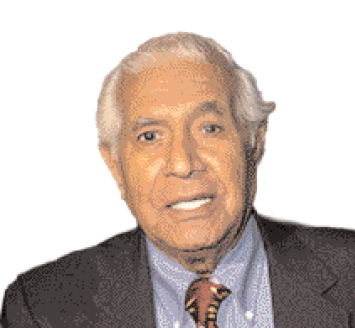Kumar Pallana is best known for his indelible performances in the three Wes Anderson-Owen Wilson movies: as Kumar the faltering safecracker in Bottle Rocket; as the enigmatic, ecstatic Mr. Littlejeans in Rushmore; and as Pagoda, the family butler in The Royal Tenenbaums.
But this is only the most recent step in an entertainment career that has spanned almost seventy years. Born in India in 1918, Pallana began as a juggler and singer, performing for small Indian communities throughout Africa. In 1946 he took his act to America, eventually appearing on several television shows, including The Mickey Mouse Show and Captain Kangaroo. Pallana also toured nightclubs in Las Vegas, Paris and Beirut, combining magic, rope tricks, comedy and plate-spinning under the name “Kumar of India.”
The interviewer had come upon Mr. Pallana’s phone number some time before, but was not sure what to do with it. The best proposal so far involved inviting him out to see Shanghai Knights, the new Owen Wilson-Jackie Chan movie. That idea had some promise, but then this interview was suggested and that seemed a little healthier.
The interview takes place on a Saturday morning in the neat, spare Oakland house where Pallana lives with his daughter Sandhya. (His son Dipak, who has also appeared in all three Anderson-Wilson movies, lives nearby.) On the bookshelf: What’s New in Magic, Central America on a Shoestring, Moby-Dick, How to Play the New Backgammon, Locke: An Essay Concerning Human Understanding, Gorilla Games. Still light on his feet at age eighty-four, Pallana sets out two mugs of chai and two slices of pound cake. When the interviewer, who had skipped breakfast, ate the cake too quickly, another slice immediately appeared.
Due to space constraints, the printed interview does not include a terrific story about a faked suicide in San Juan.
—Eli Horowitz
THE BELIEVER: What was one of your first big performances?
KUMAR PALLANA: Long Beach, 1955, ‘57. There used to be a very good television program called You Asked For It. They got a letter saying that somebody kisses snakes. [Laughs.] Some people wrote that about me, I don’t know. So, this program, they said, “Well, we’d like to have you.”
So they have a big studio, and they build very high, way up fifty feet or a hundred feet high, they build up a little platform. And I’m up there with four bottles and two chairs. One chair here and another chair there and two legs on and two off.
BLVR: And you stand on top?
KP: And then I do a handstand.
BLVR: On the chair! Where are the bottles?...
You have reached your article limit
Sign up for a digital subscription and continue reading all new issues, plus our entire archives, for just $1.50/month.
Already a subscriber? Sign in





